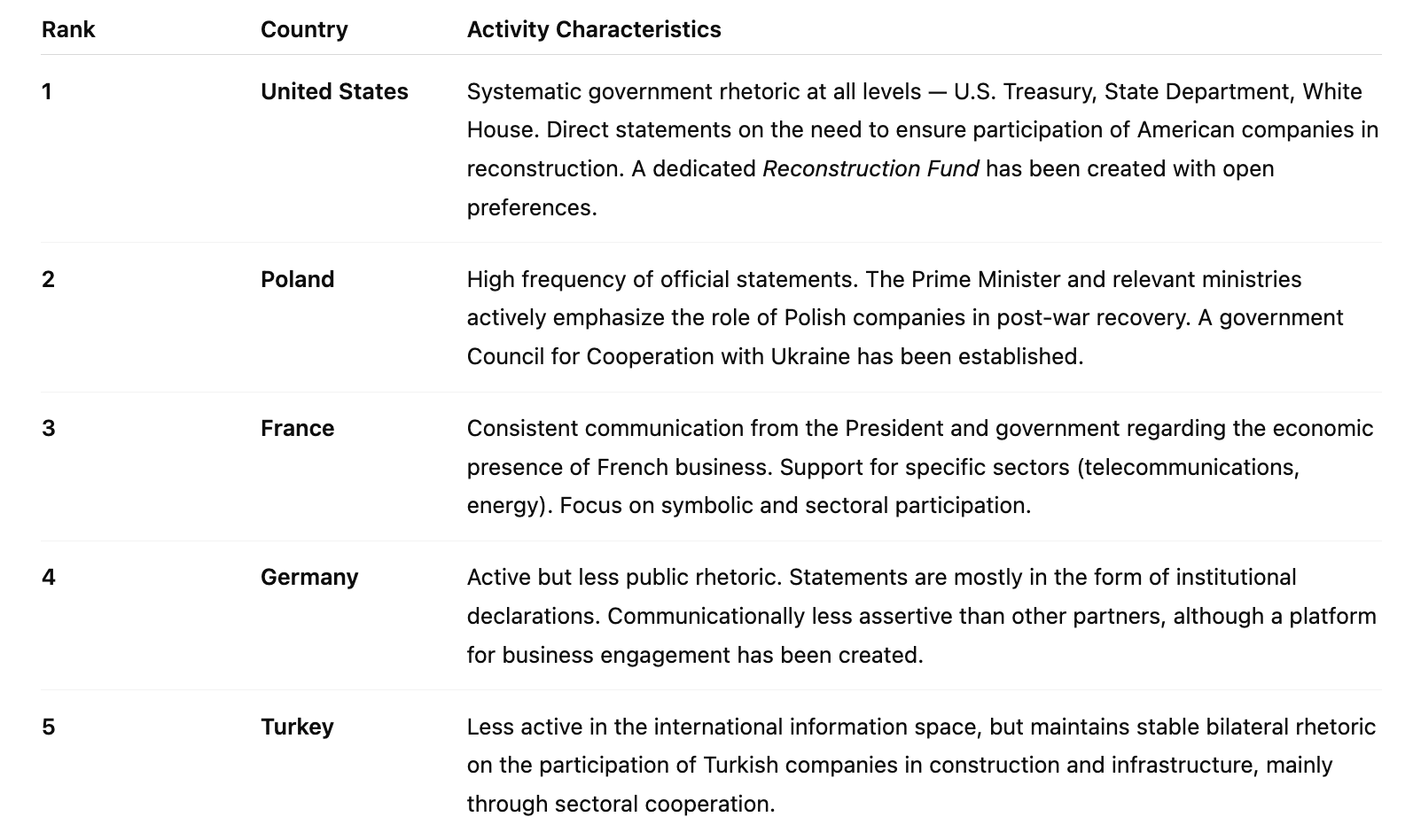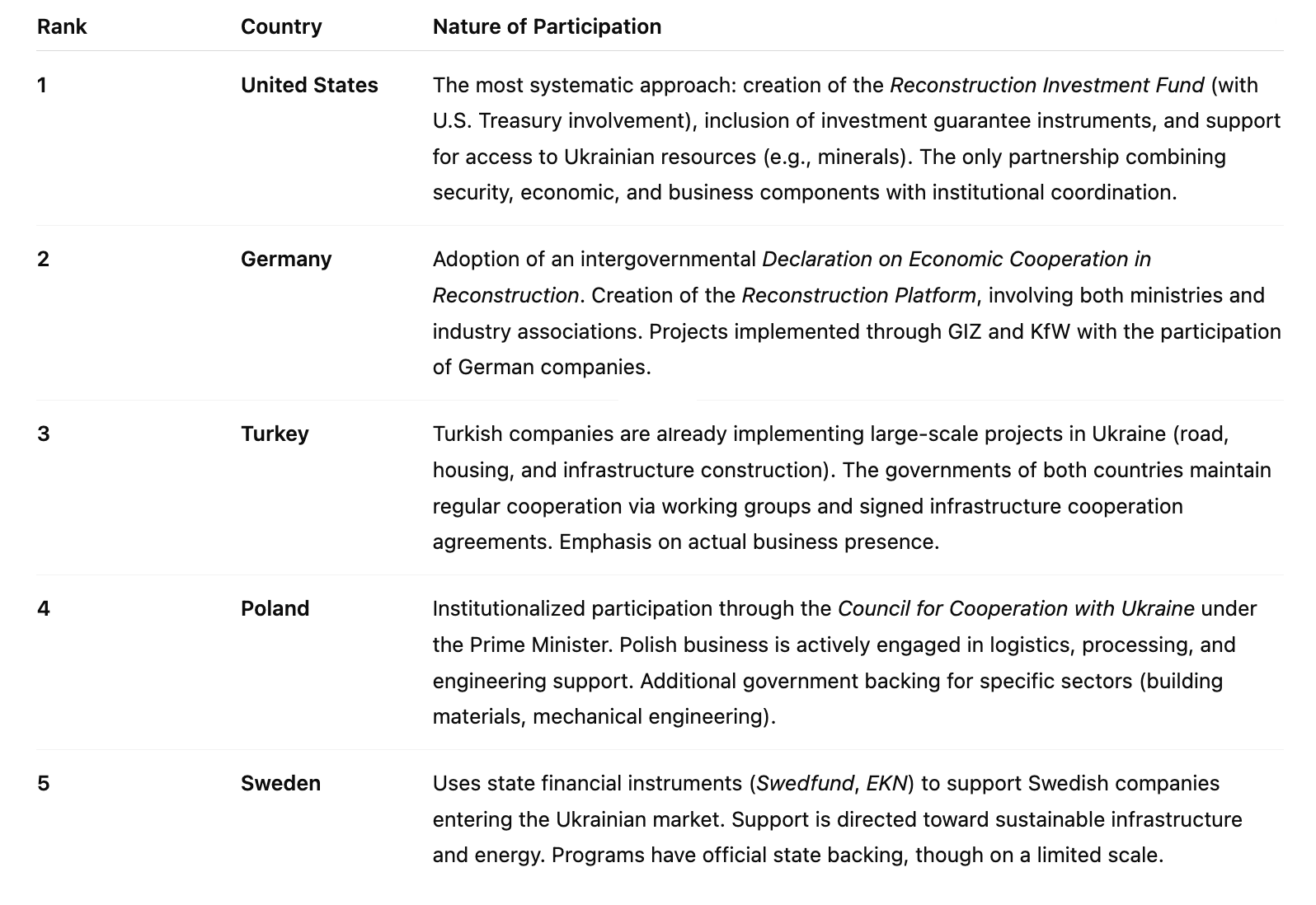
Joint Project
Ukrainian Center for Analysis and Intelligence
Most Solution Group
Mind.UA
I. General Context of Ukraine’s Post-War Reconstruction: Political, Economic, and Trade Factors
At present, most international organizations and countries from six regions of the world are actively helping Ukraine not only to resist Russian aggression but also to strengthen the capacity of state institutions and stabilize the economy.
It is important to understand that every international partner currently providing support to Ukraine views it as an investment aimed at securing political, geopolitical, economic, or military benefits — a fully justified policy.
Undoubtedly, for the vast majority of Ukraine’s partners, the key priority is to strengthen the eastern flank of Europe with a stable and strong allied state — politically, economically, and culturally integrated into the Western sphere of influence — capable of serving as a bastion against the aggressive expansion of the Russian Federation to the West.
At the same time, it would be naïve to assume that Ukraine’s international partners are free from pragmatic calculations and do not see significant commercial potential for their own economies in supporting Ukraine. Political and business elites in partner countries are well aware that in the future Ukraine will become a source of major public procurement, attractive investment projects, and a promising market for goods and services.
A positive trend in recent years is that Ukraine is increasingly perceived as a country capable of generating new technologies — particularly in the defense industry. For the first time since regaining independence, Ukraine is showing signs of technological leadership in selected economic sectors and is able to compete in these areas with leading countries worldwide.
It is natural that the governments of Ukraine’s international partners, while safeguarding the interests of their own economies and domestic businesses, are already considering how to create favorable conditions for their companies to successfully compete for the right to implement investment projects as part of the post-war reconstruction effort.
Each allied country of Ukraine chooses its own tactics. Some openly declare that, in exchange for the military and financial assistance they have provided, they expect access to public procurement contracts as part of Ukraine’s post-war reconstruction and intend to secure a special preferential regime from the Ukrainian authorities for their businesses. Others announce such intentions less publicly, yet are already making effective preparations, implementing support tools for their domestic enterprises to strengthen their position in the future competition for such projects.
It is worth noting that some countries actively supporting Ukraine in its armed conflict with the Russian Federation have already begun preparations to participate in the reconstruction process and have provided their companies with operating conditions in Ukraine that are more favorable than those available to Ukrainian firms. This advantage has been achieved through the deliberate use of political, institutional, and financial tools aimed at strengthening domestic business positions in Ukraine’s economic space.
A detailed analysis of the policies of Ukraine’s partners allows us to identify several key directions used to create favorable conditions for the participation of domestic enterprises in post-war reconstruction.
First direction — using political influence, both in “soft” form and more direct forms. Some of Ukraine’s international partners openly emphasize that they have already made, and continue to make, significant contributions to strengthening the country’s defense capabilities. Accordingly, they expect their companies to be granted priority access to major reconstruction projects once hostilities cease.
It is important to stress that this approach is not viewed negatively. On the contrary — the active and consistent involvement of certain states in supporting Ukraine during the war should be an important criterion when deciding on the openness of Ukraine’s economy to entities from these countries in the domestic market.
It must be understood that in today’s global economy it is practically impossible to restrict the presence of foreign capital. This cannot be prevented; however, it is in Ukraine’s interest that its economy primarily involve companies from countries that have proven their strategic loyalty to Ukraine’s sovereignty, security, and development.
Second direction — leveraging international institutions, especially financial ones, to influence the priorities and directions of Ukraine’s use of available financial resources.
We do not share the view that international institutions — in particular, the European Bank for Reconstruction and Development, the European Investment Bank, or the International Finance Corporation — directly implement the interests of individual states. At the same time, it is evident that these organizations set priorities and define the framework conditions for using the financial resources they manage, including in the civilian economy.
There is no doubt that countries specializing in renewable energy technologies will seek to influence international financial institutions, persuading them to prioritize renewable energy projects in the reconstruction of Ukraine’s energy system — instead of funding the rebuilding of destroyed coal power plants.
Third direction — establishing an extensive network of formal and informal communication channels with Ukrainian partners who have significant influence on the country’s policymaking processes.
Most Ukrainian researchers do not devote sufficient attention to this aspect. Meanwhile, in our view, having a broad network of contacts with key Ukrainian political actors, officials, large business representatives, and other influential groups is one of the decisive success factors for a foreign enterprise in the Ukrainian market.
Despite the general tendency to overlook this element, our research clearly shows a pattern: foreign companies with experience in Ukraine, that understand the specifics of the local environment and have built a wide network of contacts with influential actors, achieve significantly better results. This factor proves decisive regardless of other conditions, including purely economic ones.
Companies from a number of countries whose governments actively support Ukraine during the full-scale war have used the situation to build broad and deep networks of contacts within Ukraine’s state and business circles. There is already a visible trend of successfully converting this intangible asset into tangible economic benefits for the businesses of such states.
It is noteworthy that some foreign business representatives — particularly from countries that are active allies of Ukraine — demonstrate a deeper understanding of the specifics of “Ukrainian networking” and the mechanisms of “business–political alliance building” than a significant portion of domestic entrepreneurs. Unsurprisingly, it is these companies that are winning the competition for the most financially attractive projects in Ukraine.
We do not assess whether such practices are positive or negative — we merely acknowledge the existence of this feature in doing business in Ukraine’s realities. Given the significant impact of this factor on business competitiveness, it has been included in our study.
Fourth direction — using financial and economic tools that Ukraine’s partners employ to support their enterprises in achieving strategic goals related to their presence and growth in Ukraine.
For many Ukrainian entrepreneurs and political figures, it is little known that some of Ukraine’s international partners have already implemented special programs offering a set of financial support tools. These instruments are aimed at facilitating operations with Ukrainian contractors or directly supporting the activities of foreign companies in Ukraine.
To this end, a wide range of tools is used, the most common being financial and insurance mechanisms. Some countries provide their companies with preferential export credits to expand their operations in Ukraine and partially cover the risks associated with such activities.
The vast majority of countries also provide their enterprises with technical, advisory, and legal support for conducting business in Ukraine.
In our view, most of Ukraine’s international partners have not yet fully implemented programs to support their own businesses in the Ukrainian economic space, waiting for clearer prospects for the end of the war. It is likely that, once the situation stabilizes, comprehensive and large-scale national business support mechanisms will be launched: long-term financing, expanded state guarantee systems, investment risk reduction, and coordination with Ukraine’s authorities in the implementation of joint projects.
To assess the position of enterprises from various countries that will compete for public procurement contracts as part of large-scale investment projects in Ukraine, we conducted a comprehensive study. It encompasses a wide range of factors determining the level of competitiveness of companies in the Ukrainian market.
We do not share the idealistic belief that, after the war in Ukraine ends, a perfectly transparent free-market model will prevail — one in which all companies have equal access to public procurement and the winner is selected solely based on price/quality/experience criteria.
In this study, we move away from such theoretical abstractions, which may be useful when analyzing processes in developed and institutionally stable economies, but are of little value when applied to the realities of doing business in a country engaged in a full-scale war.
This research is the first to take into account not only economic factors but also institutional aspects, which have an equal or, in some cases, even greater impact on the success of business activities in Ukraine.
The presentation contains key findings from the study “Competitiveness Ranking of Enterprises from Individual Countries Planning to Participate in Ukraine’s Reconstruction.” The goal is to assess the potential of foreign businesses to effectively participate in post-war reconstruction, taking into account both economic and institutional factors that shape competitive advantages in the Ukrainian market. For comparison, the position of Ukrainian companies was also evaluated.
The analysis includes both objective economic indicators (Group I) and factors assessed using expert judgment (Group II). This approach combines quantitative evaluation with qualitative analysis of structural and institutional factors that are not always directly measurable but significantly influence the actual competitiveness of companies in the Ukrainian context.
Group I includes measurable economic factors and comparable empirical data — the standard set of key parameters affecting the competitiveness of companies from each country.
Group II includes important factors that usually remain outside the scope of traditional economic analyses, although their impact on real competitiveness is substantial. In the context of our study, the key ones are:
1. Level of wartime support for Ukraine from the country of company registration.
We assume that enterprises from countries consistently supporting Ukraine will, in practice, receive preferential status in the Ukrainian market.
While this may not be formalized in law, there is little doubt that such companies will be treated more favorably by state institutions, Ukrainian partners, and the public. For example, it can be expected that German or British companies will operate in a more favorable business climate than companies from Belarus — even if the latter’s owners are not politically connected to their government.
2. Political support from the home government and the degree of engagement in promoting business interests.
Approaches among Ukraine’s partners differ significantly. While some states formally do not create special conditions for their companies in Ukraine, most have already introduced effective support mechanisms. This influences corporate decisions on whether to invest in, or expand operations within, Ukraine.
Some governments take a passive stance, avoiding involvement in the geographic expansion of their businesses, while others actively encourage companies to use available support tools to increase their activity in Ukraine — directly boosting investment engagement.
3. Development of formal cooperation channels with Ukrainian state authorities and officials at various levels.
Since the start of the full-scale war, the intensity of Ukraine’s international contacts has increased. Despite efforts to centralize Ukraine’s communication with supranational organizations (EU, NATO), many influential states have focused on bilateral channels with the Ukrainian authorities.
Some countries have used this period to establish a broad network of official intergovernmental contacts — an institutional foundation for promoting economic interests during the post-war period. These channels currently address Ukraine’s urgent needs, but after the war they will be adapted for consistent lobbying of economic interests.
4. Development of informal networks between companies from a given country and key influence groups in Ukraine.
Historically, this has been one of the main competitive advantages of many Ukrainian companies. However, since the full-scale invasion, business models in Ukraine have become more understandable to foreign partners. Many have stopped expecting the Ukrainian business environment to quickly adapt to developed-country standards and have instead adapted themselves to local specifics.
As a result, many foreign companies now have even more extensive informal contact networks in Ukraine than some domestic businesses, and they use them effectively, often outperforming Ukrainian enterprises.
5. Nature and depth of cooperation with international financial institutions (EIB, IFC, EBRD, etc.).
These institutions are currently among the key investors in Ukraine’s economy and are likely to play a significant role in reconstruction. Experience in implementing projects with their support is an additional advantage in future competition for major reconstruction contracts.
Some countries also have greater influence over the policies of these institutions, allowing them to shape strategic frameworks and investment priorities in ways that may benefit their companies’ access to reconstruction programs.
In this study, we conducted an in-depth analysis of each country’s policy in supporting its domestic business and facilitating its operations in Ukraine, as well as examined all significant foreign investment cases since the start of the full-scale war.
This made it possible to identify, among other things, cases where companies from certain countries actively entered the Ukrainian market by partnering with local entities — an indication of market familiarity and willingness to adapt. At the macro level, we observed, for example, the creation of a systemic intergovernmental contact network by one of Ukraine’s key partners, covering all levels — from political to technical — as a foundation for later promoting its business interests in Ukraine.



a) Despite uncertainty about when the war will end, most partner countries are demonstrating strategic thinking and are already implementing institutional, financial, and political mechanisms aimed at securing favorable conditions for the expansion of their companies into Ukraine in the medium- and long-term perspective.
b) In the post-war period, Ukrainian enterprises will hold a weaker position in the domestic market compared to companies from a number of foreign states — a trend already visible today.
In-depth analysis of economic processes shows that Ukrainian companies will likely emerge from the war more psychologically resilient and more willing to accept significantly higher investment risks than most firms from other countries. At the same time, the war has severely weakened their financial capacity, which may seriously limit their competitiveness in the near term.
The position of Ukrainian business is further undermined by the fact that most international partners — rightly viewing the Ukrainian market as highly risky — are actively introducing mechanisms to support their own companies. Meanwhile, the Ukrainian government operates under the assumption that there is no need for such measures and that the local business sector will manage on its own.
c) The extended version of the study presents the strengths of enterprises from each country, clearly indicating the factors that most strongly determine their competitiveness in the Ukrainian market.
The general conclusion is this: foreign companies have already achieved such a strong position in Ukraine’s economy and politics that they are able to compete effectively with domestic businesses. Increasingly, they are eliminating the institutional advantages that for a long time allowed Ukrainian enterprises to maintain leading positions in the domestic market.
We are convinced that representatives of Ukrainian business who expect the end of the war to bring them easy access to a large share of public procurement within reconstruction programs will be very surprised to find that the most attractive contracts will go to foreign companies.
d) Ukrainian authorities and domestic enterprises should closely monitor the business support policies implemented by Ukraine’s key international partners within its territory. This is not about creating non-market preferences for Ukrainian companies, but about ensuring equal access to economic opportunities — including public procurement and investment projects — for all market participants, regardless of country of origin.
It is essential not to introduce tariffs or artificial, informal barriers for enterprises from countries that are actively supporting Ukraine during the war. At the same time, providing Ukrainian companies with access to long-term financial resources and mechanisms for partial coverage of risks associated with implementing investment projects in Ukraine — similar to those already used by many foreign companies operating in the Ukrainian market — should be considered fully legitimate and market-oriented economic policy tools.
Monitoring of Institutional Changes in the CEE: Report for Investors
Аnalytical research
Post-war Reconstruction of Ukraine: Expectations, Plans, and Strategies of International Partners
Аnalytical research
Industry Development Trends and Forecast in CEE: Research Report
Аnalytical research